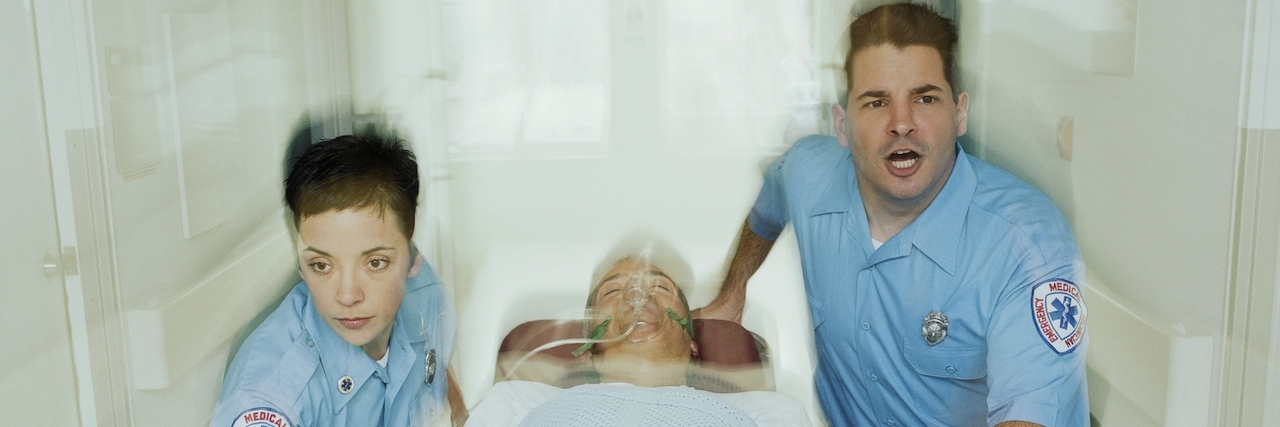11 Things I Want the ER Staff to Know as a Person With a Mental Illness
OK people, this is something that has been on my mind after a recent conversation. As a disclaimer, I only speak from my experience, and you may or may not agree with me.
There are a few things I would like hospital emergency room staff to know when they treat people in a psychiatric/mental health crisis:
1. I am a highly intelligent human being. I have thoughts and feelings comparable to you, ER doctors and staff.
2. I did not ask for my psychiatric crisis to happen to me. I did not cause it. I have a mental illness — an illness. You would never treat a person who comes to the hospital with a heart attack or diabetic crisis as if they caused it. Why do you treat me as so?
3. If I come to your hospital for medical clearance to be processed through to a psychiatric hospital and I am calm yet anxious, then there is no need to strip me down and station a security guard at the end of my stretcher. I am not a criminal. Please, don’t treat me as one.
4. Like many others in psychiatric crisis, I need to be able to move around. Please, don’t automatically take my anxiety and need to walk around or pace as a sign of aggression. Please, put me in an area where I can freely move around safely. It will calm my anxiety and make me infinitely easier to deal with.
5. Do not tell me to sit and be good, like I am somehow bad because of my illness rearing its ugly head. I am not a child.
6. Do not threaten to put me in restraints if I can’t sit still or if my mouth is running in overdrive and you feel I am being disruptive.
7. Do not put me in restraints as a punitive move to make your life or job easier. It only adds new trauma to my life, awakens old trauma and does not help me to trust you as a doctor are really trying to help me.
8. Please, don’t treat me like an inconvenience because you have people who you consider to be really ill in the ER. If I am somehow not ill, then what am I doing in an emergency room?
9. As an ER doctor, if you are really not sure what is going on with me, then call in a consulting specialist, maybe a psychiatrist with advanced training in treating mental illnesses. Don’t leave me hanging until some on-call emergency service person from a local mental health center can assess me. Psychiatric illness and physical illness go hand in hand. A person with a broken bone comes in and you call an orthopedic doctor to consult. You don’t call in an athletic trainer, do you?
10. I may have many issues going on, including the possibility of great physical pain. Please, don’t look at my chart and assume any pain I have is “in my head” or I am exhibiting “drug-seeking behavior.” Hate to be the one to tell you, but although I have a psychiatric issue, it is extremely possible and likely I actually am in pain.
11. I, as a person with a severe and persistent mental illness, have encountered more stigma from the medical profession than in any other area of my life. Kinda ironic, huh? Please, keep that in mind.
To hospitals, if you are so worried about psychiatric patients disturbing your emergency room staff or other patients, whom you do regard as ill, create a designated psychiatric emergency room. Do it the right way, where we can receive an assessment and emergency treatment in a setting safe for all, dignified and as least restrictive as possible.
Are psychiatric issues any less deadly or devastating than other illnesses? Do we deserve less than a hospital’s best treatment?
Please, put peer specialists on your emergency room staff. They are people who have lived through what a person in crisis is going through. They will ultimately be more helpful to me than the doctors or nurses who I perceive to be “normal” but who don’t have a clue about my experience in having a mental illness. Learn what you can about trauma informed care and practices. Practice it, make sure your staff understand it.
Lastly, please treat me with dignity. I really don’t want to be in your ER any more than you want me in it. I know when I am in the active phases of my illness, I may be a pain in the ass. I may be confrontational. I may not make a lot of sense when you speak to me. It’s a part of the illness and something I may not be able to consciously control.
Please, consider what I may be like when I am well. I may be a person you could actually like. Don’t hold my illness against me. Treat me as you would like to see a loved one treated. Thank you.
The Mighty is asking the following: Describe a moment when you were at a hospital and a medical staffer, fellow patient or a stranger made a negative or surprising comment that caught you off guard. How did you respond to it? Check out our Submit a Story page for more about our submission guidelines.

